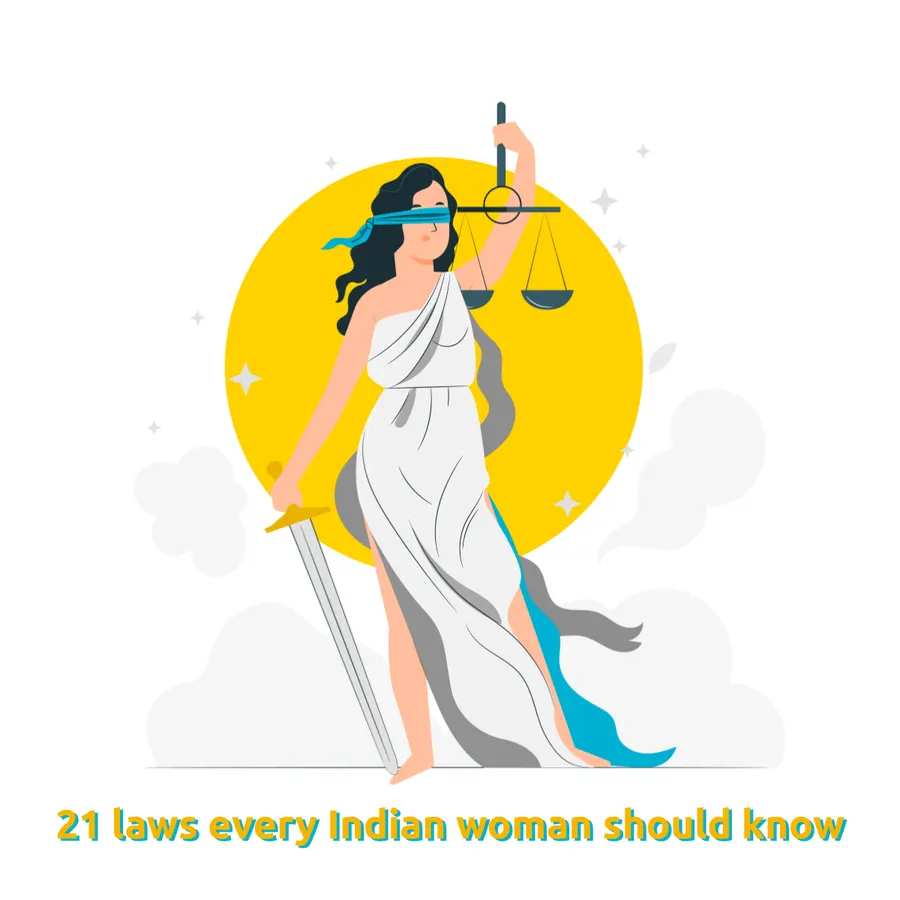21 Must-Know Laws for Indian Women
6 minuteRead

Women in our nation have reached great heights of success, yet most of them are still not aware of the most common laws for Indian women laid down by our government.This article attempts to help educate about the laws for Indian women.
Introduction
“Nothing in the world is more dangerous than sincere ignorance and conscientious stupidity.” ― Martin Luther King Jr.
Women in our nation have reached great heights of success, yet most of them are still not aware of the most common laws for Indian women laid down by our government. Whenever a wrong is done, often we let the matter slide because we don’t want to deal with police and courts. If each one of us knows our rights, instead of being terrified, we could actually fight the wrong. This article attempts to help educate about the laws for Indian women. The term Police itself is so misunderstood by us. POLICE stands for Public Officer for Legal Investigations and Criminal Emergencies.

Ever partied too loud or too late for the police to come and intervene? Or have been in a situation where the traffic police have threatened to take you to the police station? Well, they can’t!
- When women interact with a Police Officer- Women cannot be arrested after sunset and before sunrise. If arrested, they have to be presented before a Magistrate within 24 hours and should be kept in a prison separate from the male prisoners. The arrest and search of your body can be made only by a female officer.
- If any form of questioning is required with the Police: If the police officer wants to do any investigation or question you further about any complaint you may have filed, he needs to come to your home and do such questioning at your residence. The police officer cannot call you alone to the police station or any other place of his choice.
- When Woman endures sexual harassment or a sexual assault at the workplace: Each one of us has had that sneaky boss of ours eyeing us in a manner that made us uncomfortable. Or in an interview, a sexual favor was demanded in exchange for the job. Whether verbal or non-verbal, such action is not acceptable. All such complaints are to be filed within three months of the occurrence with the Internal Committee at your workplace. If there is no Internal Committee, you can file all such complaints with the Local Committee in the town where you work or reside.
- Women have a right to Equal Pay: There should be equal pay for men and women for the same work done by them in the same position. For example, Two team leads with equal experience, should receive the same salary irrespective of their gender. No gender discrimination can be made even during the hiring process. This has also been guaranteed under the Indian Constitution.
- When a woman works night shifts- There should be proper security measures taken by your employer if your job demands night shifts. This includes your travel to and from work. No woman should be made to work alone in a night shift and has to be necessarily placed in a group.
- Woman’s right to say No and Sexual Assault: When you are touched sexually without consent, or forced or coerced to establish any form of physical relationship, it is sexual assault. If any form of threat is made to you to get the consent, it is not consent. Stalking, eve-teasing, Voyeurism, acid attack, outraging a woman’s modesty, showing pornography etc. are all considered to be sexual assault and sexual violence.
- Woman’s Right to Privacy: The identity of a sexual assault victim is to be kept confidential under all circumstances. Your statement may be recorded by before a Magistrate without being overheard by anyone else. Even in the judgment, the judge refers to you as the ‘victim’. All the Bollywood movies where cross-examination is done in open court, it is only entertainment purposes. The reality is very different.
- Medical Examination in the event of rape and sexual assault: A medical test to establish rape should be conducted within the first 72 hours of the incident. It is to be performed by a female doctor. The test establishes any sexual activity performed on the woman and helps to detect the rapist if any semen sample is found in the victim’s body. Rape is a crime and not a medical condition.
- FIR in case of Sexual Assault: There is no time limit to report rape or sexual assault. A case may be filed in any police station that the victim wants to, in the presence of a female constable. This is known as the Zero FIR. Section 375 and 376 of the IPC deal with rape. In certain cities like Delhi, a woman may report a sexual assault online or through a registered post letter to a senior police officer.
- Woman’s Right to Free Legal Aid: When reporting a sexual assault, if you do not have a lawyer present, you may ask for legal aid and the police officer has to provide you with it.
- Right of Abortion: Abortion is the right of a woman. Hence, no parental or husband’s consent is required to abort. Under normal conditions, until the 20th week, the woman can abort and if there is any risk to the life of a mother, abortion can be done until the 24th week.
- But without the woman’s consent, abortion is illegal and a punishable offense. During pregnancy, under no circumstances can any test be performed to find out the gender of the baby. This is a crime.
- Right against cyber crimes: With the advent of technology, it has become much easier for criminals to hide behind their digital screens and harass women. Cyber Stalking, Identity theft, Online Defamation, Morphing pictures, pornography, etc. are all crime.
- Cybercrime complaints may be filed online or in your nearest police station. You may file a complaint anonymously as well.
- Rights of a married woman: The Supreme Court in India has said that every married woman should be treated with dignity and respect. You are entitled to live in the same house as your husband and to be maintained by him. Any act of bigamy on the part of your husband is a punishable offense.
- Woman’s right Against Domestic Violence: If your husband or any other man in your house hits you, you can file a Domestic violence case. This may be filed with or without simultaneously asking for Divorce.
- Right to Property and Streedhan: All the gifts received by you before and after marriage ceremonies or during childbirth, is your personal property and no one can take it away from you, not even your husband. You have an equal right in your father’s property as well. Similarly, you also have a right in your husband’s property after his death.
- Woman’s right to give divorce: Divorce is always a second chance at happiness and everyone deserves to stay happy. If any cruelty is being meted out to you, you can ask for a divorce. Adultery, Bigamy, religious conversion, insanity, missing for over 7years, or non- consummate the marriage, are divorce grounds.
- If your husband has committed rape, bestiality or sodomy; on any other person, it may be a ground for divorce provided you can prove it. Marital rape is considered in India only when the age of the wife is less than 18yrs.
- Note: It may be noted that the marital laws in our nation differ with respect to the caste and faith of a person.
- Right to Maintenance and Alimony: In the event of judicial separation or divorce, a woman is entitled to maintenance from her husband for herself and her children, as long as she does not remarry. The amount depends on your lifestyle under Section 125 of CRPC and decided by a judge. Alimony is a one-time payment of maintenance.

- Right to Child’s custody: Ideally for a child below the age of 5yrs, the mother is the natural guardian and the child should remain in the mother’s custody. A female minor child is usually placed in the mother’s custody always.
- A right to Maternity benefits: Becoming a mother is one of the best feelings in the world and it should not stand in the way of your success and career graph. Every expecting, adopting or surrogate mother has the right to maternity benefits. It may be claimed for up to 26weeks and post this, if the nature of the job permits, you can opt for work from home. During the period of maternity leave, you cannot be fired or demoted. Even if the mother dies during childbirth, your heir is entitled to the payment of any maternity benefit that is due. Even at instances of miscarriage, it is supposed to be paid. Some common queries were answered by the Ministry of Labour & Employment which may also be helpful- Maternity Benefit Laws
- Woman’s right to Live-in relationship: Any sound woman above the age of 18yrs has the right to choose her partner whether to get married or be in a live-in relationship with. Live-in relationships are legally recognized by the law. And children of such couples also have legal rights against the father.
- Right against Dowry: Both giving and receiving dowry, whether in the name of gifts or anything else is strictly prohibited. If you are being tortured by your in-laws in the name of dowry, you may seek divorce and legally imprison your husband and his family.
National Commission For Women
The NCW is a government body in India that aims to voice the rights of women in our country. It has advocated and fought against archaic laws. It strives to ensure the safety of women, both inside and outside their houses.
If anyone of you have any further questions regarding your rights, you may click the link below to seek help for all such matters: https://www.ncw.nic.in/helplines
The website also provides the space to ask your questions online as well. https://ncw.nic.in/
The National Women Helpline number is 181.
My Personal Experience:
Being a lawyer, I have encountered many women who wanted to file for divorce or get an abortion or wanted to file a complaint in general for any atrocity meted out to them. But more often than not, they would not go through with it despite living horrendous lives. Their biggest fears involved only one question- What will the people think? Log kya kahengey! And how would they support themselves and their children after the incident? But all these fears are unnecessary as there are enough laws in our nation to protect the interest of women.

Conclusion
India, the land of Durga, Kali and Saraswati, ironically is famous for being one of the most aggressively dominant patriarchal societies in the world. But since Independence, one step at a time, an attempt is made to bring change. The laws though abundant lacks awareness.
Women have traveled a long way from being uneducated and married at the age of 10yrs to now becoming the CEO’s of some of the most prestigious companies worldwide. Battles are being fought day in and day out in against patriarchy but most battles are yet to be won.
Once the rights are identified, it shall become increasingly easy to get these rights implemented. One step at a time and we shall be in an equal state with the men in our society if not superior. This is where feminism begins. This article hopes to be a step in the direction of achieving that.
Write, Record and Answer! Consume Unlimited Content! All you need to do is sign in and its absolutely free!
Continue with one click!!By signing up, you agree to our Terms and Conditions and Privacy Policy.










